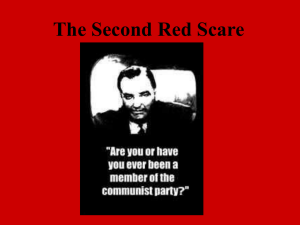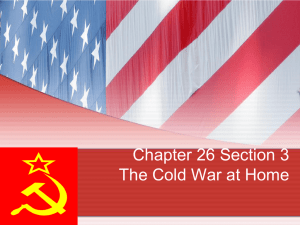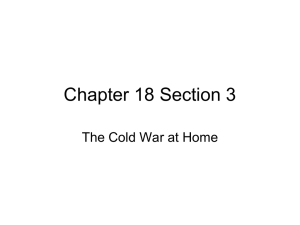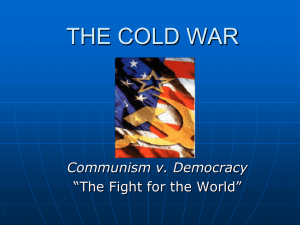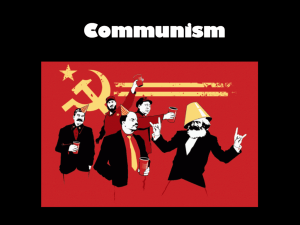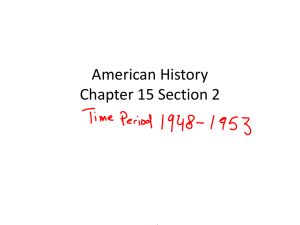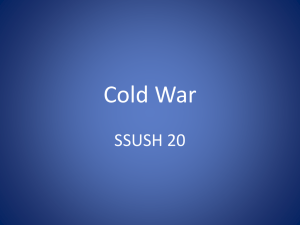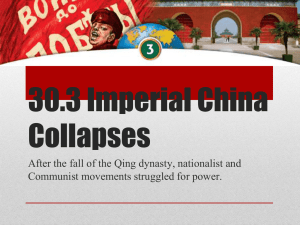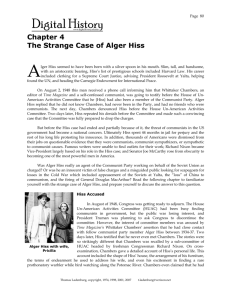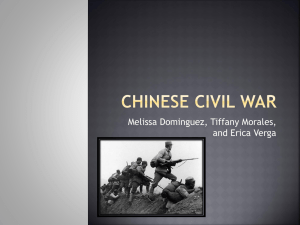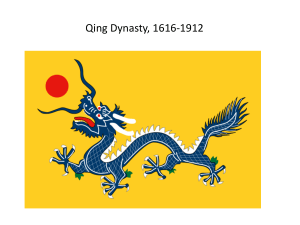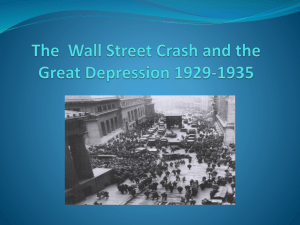Chapter 18 Section 3 - Guthrie Public Schools
advertisement
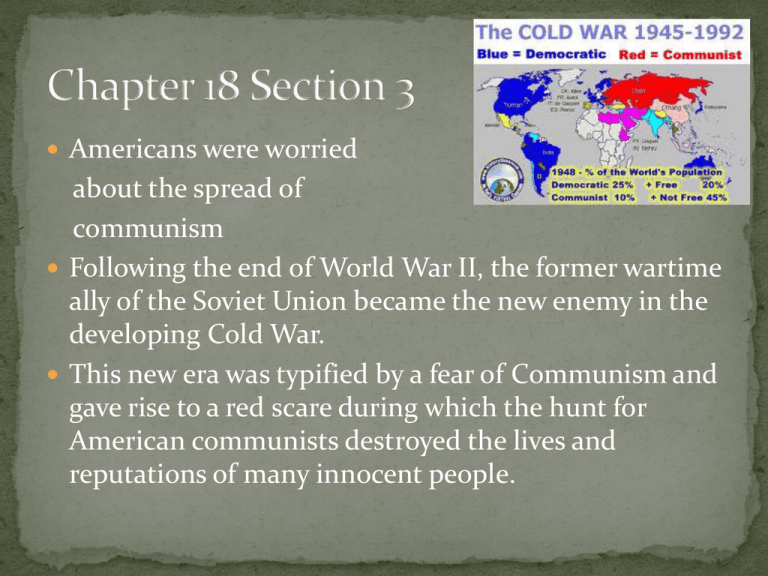
Americans were worried about the spread of communism Following the end of World War II, the former wartime ally of the Soviet Union became the new enemy in the developing Cold War. This new era was typified by a fear of Communism and gave rise to a red scare during which the hunt for American communists destroyed the lives and reputations of many innocent people. Feeding into the atmosphere of distrust that was created by the red scare, was the executive order issued by Truman creating a Loyalty Review Board. The Loyalty Review Board investigated over 3 million employees of the Federal Government, delving into their past and present affiliations and actions in order to weed out those suspected of being communists or communist sympathizers. Over 200 were fired and thousands of others resigned, many in protest over the investigation and the secrecy surrounding the evidence being collected about them. The House Committee on Un-American Activities (HUAC) became a standing (permanent) committee in 1945. Representative Edward J. Hart of New Jersey became the committee's first chairman. Under the mandate of Public Law 601, passed by the 79th Congress, the committee of nine representatives investigated suspected threats of subversion or propaganda that attacked "the form of government guaranteed by our Constitution." Under the mandate of Public Law 601, the committee focused its investigations on real and suspected communists in positions of actual or supposed influence in American society. The first such investigation looked into allegations of communists in the Federal Theatre Project in 1938. A significant step for HUAC was its investigation of the charges of espionage brought against Alger Hiss in 1948. This investigation ultimately resulted in Hiss's trial and conviction for perjury, and convinced many of the usefulness of congressional committees for uncovering communist subversion. In 1947, the committee held nine days of hearings into alleged communist propaganda and influence in the Hollywood motion picture industry. After conviction on contempt of Congress charges for refusal to answer some questions posed by committee members, the "Hollywood Ten" were blacklisted by the industry. Eventually, more than 300 artists—including directors, radio commentators, actors and particularly screenwriters—were boycotted by the studios. Some, like Charlie Chaplin, left the U.S. to find work. Others wrote under pseudonyms or the names of colleagues. Only about ten percent succeeded in rebuilding careers within the entertainment industry. In 1947, studio executives told the committee that wartime films – such as Mission to Moscow, The North Star, and Song of Russia – could be considered pro-Soviet propaganda, but claimed that the films were valuable in the context of the Allied war effort, and that they were made (in the case of Mission to Moscow) at the request of White House officials. In response to the House investigations, most studios produced a number of anti-communist and anti-Soviet propaganda films such as John Wayne's Big Jim McLain, Guilty of Treason (about the ordeal and trial of Cardinal József Mindszenty), The Red Menace, The Red Danube, I Married a Communist, Red Planet Mars, and I Was a Communist for the FBI, which was nominated for an Academy Award for the best documentary in 1951 and also serialized for radio. Universal-International Pictures was the only major studio that did not produce such a film. The McCarran Act of 1950 is a United States federal law that required the registration of Communist organizations with the United States Attorney General and established the Subversive Activities Control Board to investigate persons suspected of engaging in subversive activities or otherwise promoting the establishment of a "totalitarian dictatorship," fascist or communist. Members of these groups could not become citizens, and in some cases, were prevented from entering or leaving the country. Citizen-members could be denaturalized in five years. It was a key institution in the era of the Cold War, Much of the Act has been repealed, but some portions remain intact Alger Hiss (November 11, 1904 – November 15, 1996) was a U.S. State Department official involved in the establishment of the United Nations. He was accused of being a Soviet spy in 1948 and convicted of perjury in connection with this charge in 1950. On August 3, 1948, Whittaker Chambers, a former Communist Party member, testified under subpoena before the House Committee on Un-American Activities (HUAC) that Hiss had secretly been a Communist while in federal service, despite the fact that Chambers had previously testified under oath that Hiss had never been a Communist. Called before HUAC, Hiss categorically denied the charge. When Chambers repeated his claim in a radio interview, Hiss filed a defamation lawsuit against him. During the pretrial discovery process, Chambers produced new evidence indicating that he and Hiss had been involved in espionage, which each had denied under oath to HUAC. A federal grand jury indicted Hiss on two counts of perjury; Chambers admitted to the same offense, but as a cooperating government witness he was never charged. Although Hiss's indictment stemmed from the alleged espionage, he could not be tried for that crime because the statute of limitations had expired. After a mistrial due to a hung jury, Hiss was tried a second time. In January 1950, he was found guilty on both counts of perjury and received two concurrent five-year sentences, of which he eventually served 44 months. Arguments about the case and the validity of the verdict took center stage in broader debates about the Cold War, McCarthyism, and the extent of Soviet espionage in the United States. Although a variety of evidence has been added to the debate since his conviction, the question of Hiss's guilt or innocence remains controversial. Some reliable sources have suggested that those who believe in Hiss's innocence are in the minority of scholarly opinion McCarthyism- McCarthyism is the practice of making accusations of disloyalty, subversion, or treason without proper regard for evidence. It is a term describing the intense anti-communist suspicion from the late 1940s to the late 1950s. This period is also referred to as the Second Red Scare It coincided with increased fears about communist influence on American institutions and espionage by Soviet agents. Originally coined to criticize the actions of U.S. Senator Joseph McCarthy, "McCarthyism" later took on a more general meaning, not necessarily referring to the conduct of Joseph McCarthy alone. During this time many thousands of Americans were accused of being Communists or communist sympathizers and became the subject of aggressive investigations and questioning before government or private-industry panels, committees and agencies. The primary targets of such suspicions were government employees, those in the entertainment industry, educators and union activists. Suspicions were often given credence despite inconclusive or questionable evidence, and the level of threat posed by a person's real or supposed leftist associations or beliefs was often greatly exaggerated. Many people suffered loss of employment, destruction of their careers, and even imprisonment. Most of these punishments came about through trial verdicts later overturned, laws that would be declared unconstitutional, dismissals for reasons later declared illegal or actionable, or extra-legal procedures that would come into general disrepute. The most famous examples of McCarthyism include the Hollywood blacklist and the investigations and hearings conducted by Joseph McCarthy. It was a widespread social and cultural phenomenon that affected all levels of society and was the source of a great deal of debate and Chapter 18 Section 3 Quiz • • • • 1.) What were Americans afraid of in Europe? a.) The spread of Democracy b.) The spread of Communism c.) That Russia would not become a super power • • 2.) Who become the U.S. biggest enemy after WWII? a.) The Soviet Union b.) France c.) Germany • 3.) What term was used to describe Americans fear of the Spread of Communism? a.) The Communist Scare b.) The White Flag Scare c.) The Red Scare • • • • 8.) What was the only studio that did not produce anti-communism films? a.) Universal Studios b.) MGM Studios c.) Paramount Studios 4.) What did the U.S. Government start doing to its employees? a.) Sent them to live in Moscow as spies b.) Expelled all employees for fear they may be communist c.) Checked their background to make sure they were not Communist supporters • • • • 9.) What part of Korea was Communist? a.) Central b.) South c.) North • 10.) What country is located just North of Korea? a.) China b.) Japan c.) Russia • • • • • • • • • • • • • • • • 5.) Name one part of the media that the Government tried to control the most as far as the information given out about Communism? a.) Magazines b.) Print Media c.) Movies • • • • • • • • • 6.) What type of movies did studios type producing? a.) Pro communism b.) Anti communism c.) Pro War 7.) Name one anti communism film made during this time? a.) The Red Danube b.) A Normal Day in the Life of Communism c.) The Hunt for Red October Chapter 18 Section 3 Quiz Con’t. • • • • • 1.) What was a federal law that required the registration of Communist organizations with the U.S. Attorney General? a.) The Communist Act b.) The Red Flag Act c.) The McCarron Act • • • • • • • • • • • • • • • • • • • 2.) What was the government trying to do? a.) Trying to find keep people from engaging in communist activities b.) Trying to create world peace c.) Trying to spread Communism 3.) What happened to people who were found to have participated in activities that promoted communism? a.) They were killed b.) They were not allowed to become citizens c.) They were forced to move to Eastern Europe 4.) What war was this called where the U.S. government was afraid that Communism was going to take over the world? a.) The Communist War b.) The Cold War c.) The Red Flag War 5.) Name one person that was accused of being a Soviet spy? a.) Andrew McCarthy b.) Alger Hiss c.) General MacArthur • • • 6.) Who was the former Soviet spy making these accusations? a.) Whitaker Chambers b.) Alger Hiss c.) Harry Truman • • • • 7.) How long did Hiss stay in jail? a.) 48 months b.) 48 years c.) 4 Months • 8.) What is a term that describes the intense anticommunist suspicion in the United States from the 1940’s to the 1950’s? a.) McCarthyism b.) Communism c.) Patriotism • • • •
